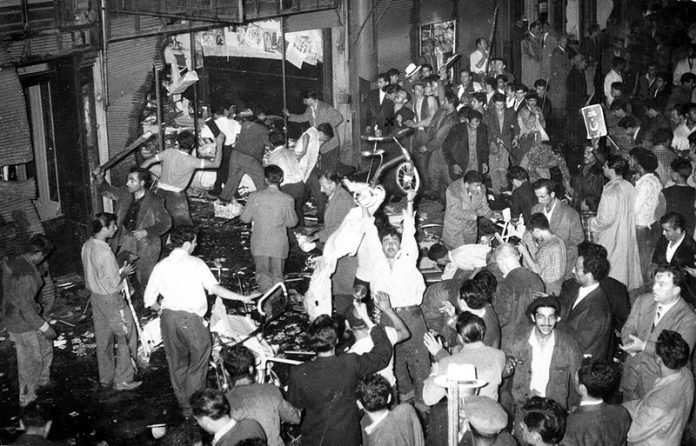Turkey’s Human Rights Association (İHD) has issued a statement condemning a pogrom that took place September 6-7, 1955, one of the largest attacks against minorities in Turkey, on the 68th anniversary of the atrocity, Turkish Minute reported.
The İstanbul pogrom started on the evening of Sept. 6, 1955, when mobs took to the streets of İstanbul and raided the Greek, Armenian and Jewish districts, destroying or looting non-Muslim houses of worship, homes, businesses, cemeteries and schools.
The pogrom, in which 37 people were killed, was triggered by false and orchestrated news reports in the Turkish press which insinuated that Greeks had set off a bomb the day before at the Turkish consulate in the northern Greek city of Thessaloniki, where the founder of modern Turkey, Mustafa Kemal Atatürk, was born.
The association’s commission against racism and discrimination on Wednesday said in the statement titled “6-7 September 1955: Is it just a state operation?” that they once again condemn the hate crimes against Christians and Jews.
“Everyone who denies the official history of this country now knows what happened during the mass pogrom on September 6-7, 1955. It has been widely written and talked about how large groups, carrying Turkish flags and transported in trucks, attacked the homes and businesses of non-Muslim citizens, primarily targeting Greeks, in addition to Jewish and Armenians and … burning, destroying, looting, lynching, raping and killing them,” the İHD said.
The association further stated that the pogrom was an operation by the state that was planned by the National Intelligence Organization (MİT) and “enthusiastically carried out by crowds who had memorized the state’s lesson well.”
“The number of people killed, as recorded, was 37. The actual number of rape cases, recorded as 60, was around 400. Some women were killed after being raped. Ninety-year-old priest Hrisantos Mantas was burned alive,” they added.
While emphasizing the fact that the state had committed a crime, did not admit its guilt, covered it up, did not hold itself accountable, did not compensate for the heavy losses of the Greek community and did not even apologize, the İHD also drew attention to the participation of the public in the atrocity.
According to official data, the extensive damage and cost to minorities — Greeks, Armenians and Jews — included 4,214 homes, 1,004 businesses, 73 churches, two monasteries, one synagogue and 26 schools.
Estimates of the economic cost of the damage vary between $24.8 million (Turkish government) to $500 million (Greek government).
The pogrom started a wave of migration out of Turkey; however, the Turkish press covered it as “the customary disloyalty of minorities.” Within a few months, the biggest businesses had been transferred from non-Muslims to Muslims, and the businesses that were destroyed were never reopened.
Most of the Greeks who stayed were exiled to Greece in 1964 — another tragedy in Turkey’s history. In that year some 30,000 Greeks in Turkey were forced to leave their birthplace with personal belongings weighing no more than 20 kilograms and no more than $20. They were not allowed to sell their houses or property or to withdraw money from their bank accounts before they left.















